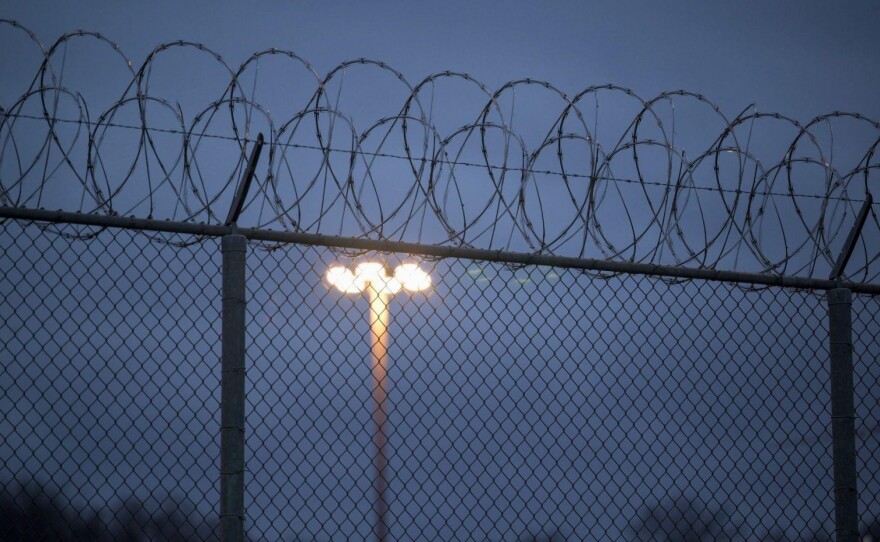One of the most volatile topics in public safety relates to solitary confinement in Virginia prisons. Prisoner rights advocates have been pushing for years to end a practice which Virginia prison administrators say, technically, does not exist in our state. What they describe instead as “restorative housing” is the subject of a new report mandated this year by the general assembly and published on December first.
The Virginia Coalition on Solitary Confinement was also assigned as a partner to study the restorative housing program and determine how to safely curb use of the practice. But the Coalition pulled out of the research and issued its own report citing a refusal by corrections officials to allow outside oversight of the research. In fact, they say that the lack of oversight of daily prison practices can mean life or death for the incarcerated. And can impact all of us when prisoners are released into society.
VIDEO TRANSCRIPT
ANGIE MILES: In the hours before daybreak on January 4th.
PRISON NURSE: This is Red Onion State Prison. We have an offender who is in full cardiac arrest.
ANGIE MILES: At Virginia's Red Onion Prison.
PRISON NURSE: We're doing CPR right now.
911 OPERATOR: How old is he?
PRISON NURSE: We found him. Oh God, I don't even know 'cause I've been too busy doing CPR.
ANGIE MILES: Anwar Phillips was dead.
PRISON NURSE: Nothing. Nothing. He's stiff as a board, so.
VERNETTA PHILLIPS: I was at work and his father called me. It took him six hours to call me because he said he did not know how to articulate the words that our son was dead.
ANGIE MILES: But what happened to Anwar? The 36 year old was confined to a wheelchair. He was isolated in a singular cell in a maximum security prison where inmates are checked every 40 minutes or less, but where Phillips had likely died hours before the 911 call.
NATASHA WHITE: You hear the nurse screaming, "He's stiff as a board," but you do not hear the nurse talking about the rope that they found tied around his neck. She claimed he was in cardiac arrest. He was cold. He had been dead for so long.
ANGIE MILES: Natasha White is Director of Community Engagement for Interfaith Action for Human Rights. She's been trying to get answers in the death of Anwar Phillips.
NATASHA WHITE: He was killed in a solitary confinement cell that you cannot get in without a key. You have to make that make sense. It doesn't. And now they are charging another young man for his death. Well, how did he get out of his locked cell to get in somebody else's locked cell and kill them?
ANGIE MILES: The cause of death now listed as strangulation, was reportedly delivered by a handmade rope. The named suspect, William Pettigrew, an inmate, who like Phillips, was serving time for murder, locked in a solitary cell at Red Onion. Anwar Phillips' mother, who preferred being interviewed off camera, is not convinced the story of his death makes sense.
VERNETTA PHILLIPS: Solitary confinement should have been the safest place in the world for him. What I want is the truth. My child is dead. I deserve the truth.
ANGIE MILES: According to data provided by the Virginia Department of Corrections, Anwar Phillips is among more than a dozen inmates murdered in Virginia State-run prisons in just over a decade. Recent homicides include 63-year-old Mark Grethen, and 47-year-old Gregory Pierce in 2021. Also 62-year-old Charles Mitchell, just days after Anwar Phillips. But in the last decade, hundreds of prisoners have been seriously injured or died of a wide range of causes including hepatitis and COVID-19. Examples include several who died at Lawrenceville, and three women at the Fluvanna Correctional Center in 2019. Two of the three had recently filed lawsuits against DOC for alleged medical negligence. Virginia Corrections administrators often cite legal constraints and privacy issues as reasons they can't divulge certain information. But prison rights advocates say that in Virginia and nationally, many departments lack outside oversight and consequently, transparency. This can make it difficult to know how many people are dying in prison or from what causes. Suicide appears to be the leading cause of death in both jails and state-run prisons. It is on the rise and so is drug use.
PHIL WILAYTO: You got a big problem in jails, in prisons in Virginia with drug overdoses. We're getting a lot of letters from prisoners asking us to focus some attention on this. One prisoner suggested that prisoners should be taught to perform CPR, because they're often the ones who are right there when a crisis happens.
ANGIE MILES: Phil Wilayto is publisher and editor of "The Virginia Defender," which keeps track of injuries and deaths of individuals in state custody.
PHIL WILAYTO: Out of the 40 facilities, there are three, Nottoway, Augusta and Buckingham that have no air conditioning. Now, this past summer, you know, we hit a hundred degrees several times, and in these buildings, it'll be another 10 degrees above that. There was one case in Nottaway this summer where a man passed away and the prisoner said it was due to the heat, although the administration said it was due to other causes. And I don't think an investigation ever went any further than that.
ANGIE MILES: Virginia's Department of Corrections has sat for an interview with "Focal Point" in the past, but declined to do so for this report. Some of the information on prison deaths came to VPM from a Freedom of Information Act request of corrections officials. Although VPM is still waiting for answers to most of our questions. Among the data provided by the department, are numbers that show prisoner deaths and serious injuries much lower than in adjoining states. Despite this relative success, Wilayto and White agree that most Americans have a hands-off approach to the way prisons operate. That translates to thousands of those behind bars being written off rather than rehabilitated.
NATASHA WHITE: People that are incarcerated are automatically dehumanized as soon as you put handcuffs on them and they start calling you inmate, that people just don't care. And they fail to realize that this is the most inhumane practice in the world.
PHIL WILAYTO: It's a closed system. And if a prisoner is and does speak out and does file a lot of grievances or has some mental issues and is acting up and gets targeted as a troublemaker and gets, you know, picked on, there's very little recourse for them or for their family. So outside oversight is a crying demand of prisoners and something that we're trying to promote.
ANGIE MILES: Prisoners do speak out. Anwar Phillips wrote to prison officials and outside advocates outlining grievances against correctional officers, many of whom he called corrupt or racist. And at least one, Phillips claimed, said he would only leave prison in a body bag, which in reality, he did.
PHIL WILAYTO: So that brings you to another issue is guard brutality. Now, you know, not all guards are bad. Not all guards are sadistic, but when you have them, you have almost no recourse.
ANGIE MILES: And who is guarding Virginia's prisoners? The National Bureau of Labor Statistics says, "A high school diploma and an absence of felony convictions are the primary requirements to be a state prison guard." Like most industries, there are persistent staffing shortages, presumably adding to the workload and the stress of working with offenders who can sometimes be violent. Research and experience show the work conditions can fuel corruption for some. When visitation was halted during the pandemic, DOC data shows that positive prisoner drug tests actually increased. Raising the question of who is bringing drugs into state prisons? In the past decade, numerous corrections officers have been charged with crimes ranging from having sex with inmates to smuggling drugs or other contraband into state facilities. In the DOC's own reporting, more employees report feeling unsafe because of their colleagues' behavior, than because of the inmates themselves.
NATASHA WHITE: Prisons should be run by trauma-informed care staff, licensed social workers, licensed nurses, psychiatrists. Those are the type of people that should run the jail. The people with the badge should just be opening the doors, because clearly they don't have it in them to help or truly rehabilitate somebody else. Also, I know plenty of correction officers that start in the Department of Corrections, normal and loving just like us, but the wear and tear of the trauma that happens in prison, it affects everybody involved. How do you stand in the lion's den and not get bit?
ANGIE MILES: White and Wilayto speak about the letters that pour in from prisoners who claim mistreatment, feeling unsafe and believing their lives are in danger. When asked how people convicted of crimes can be more reliable than the professionals who manage them, White offers this.
NATASHA WHITE: They have the most to lose. They are going nowhere. They are writing about the people that give them food, about the people that lock their door, and about the people that have the power to come in their cell with numerous other people and beat them to death and get away with it.
ANGIE MILES: To some, prisons exist to protect the public from dangerous individuals. And what happens to those convicted of crimes, is not a major concern. For others like White and Wilayto, prison is responsible for rehabilitation, and minimally, for not hastening the deaths of people not sentenced to death. And for a few what happens in prison, can be as great a crime or even worse than what led their loved ones to serve time there.
VERNETTA PHILLIPS: Anwar made his mistakes. I do not condone any negative or violent thing that he did, but he was still my child. As long as he was alive, there was hope that he could have been a better human being. The person that murdered my son, they took my hope.
In January, the Virginia Prison Justice Network will hold its sixth annual prison justice rally. The American Civil Liberties Union will begin discovery in its federal lawsuit against the step-down program, a key component of the restorative housing program, in the ACLU’s effort to dismantle the program... And William Pettigrew will face trial for the murder of Anwar Phillips--- one year after Phillips was discovered dead in his cell.








